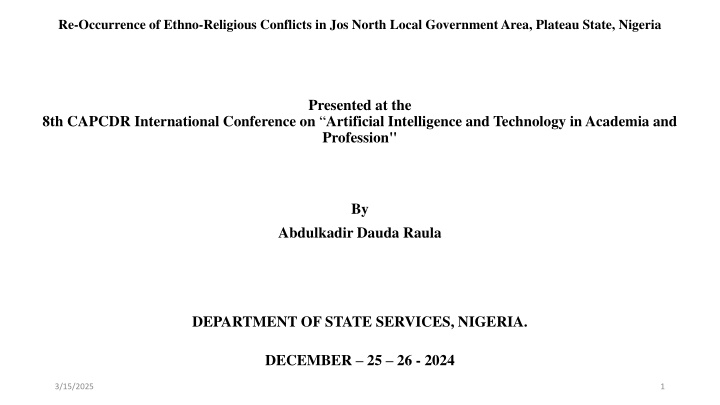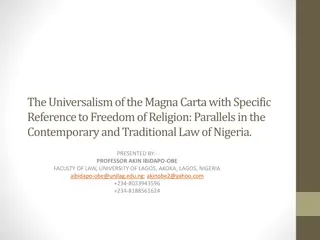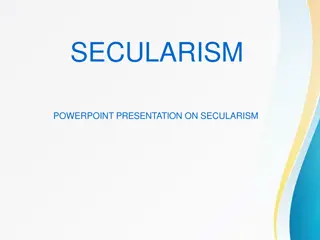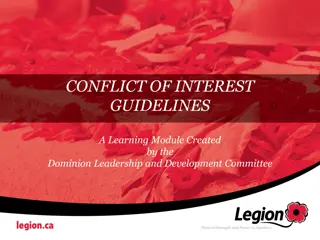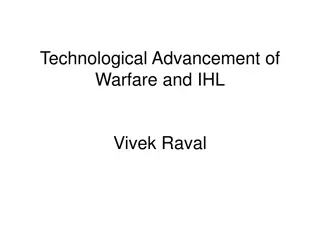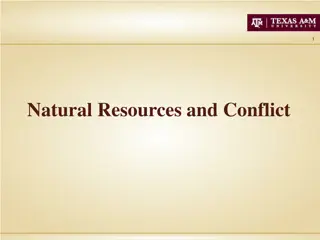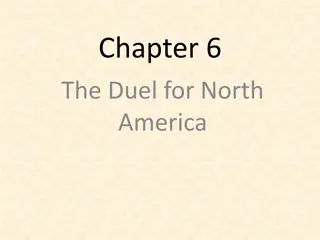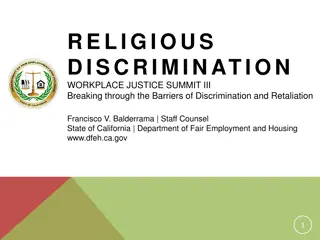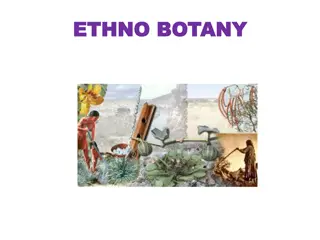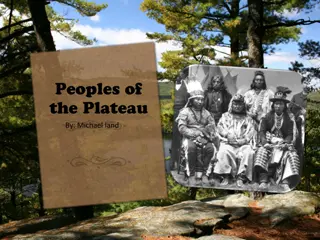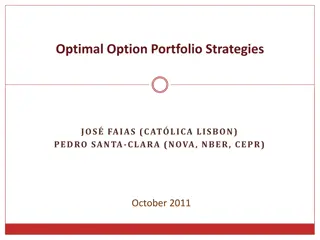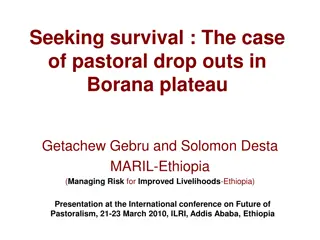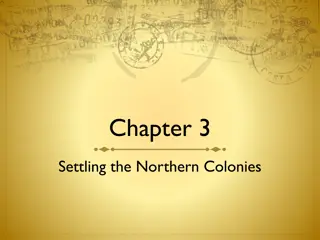Ethno-Religious Conflicts in Jos North, Plateau State: Challenges and Solutions
Conflict analysis of recurrent ethno-religious tensions in Jos North, Plateau State, Nigeria, focusing on underlying causes, impacts, and potential strategies for resolution based on established theories. The study aims to provide insights into the complex dynamics of such conflicts for sustainable peace and development.
Download Presentation

Please find below an Image/Link to download the presentation.
The content on the website is provided AS IS for your information and personal use only. It may not be sold, licensed, or shared on other websites without obtaining consent from the author.If you encounter any issues during the download, it is possible that the publisher has removed the file from their server.
You are allowed to download the files provided on this website for personal or commercial use, subject to the condition that they are used lawfully. All files are the property of their respective owners.
The content on the website is provided AS IS for your information and personal use only. It may not be sold, licensed, or shared on other websites without obtaining consent from the author.
E N D
Presentation Transcript
Re-Occurrence of Ethno-Religious Conflicts in Jos North Local Government Area, Plateau State, Nigeria Presented at the 8th CAPCDR International Conference on Artificial Intelligence and Technology in Academia and Profession" By Abdulkadir Dauda Raula DEPARTMENT OF STATE SERVICES, NIGERIA. DECEMBER 25 26 - 2024 3/15/2025 1
Introduction Conflict is an inherent issue in human societies, often resulting from political, economic, and social instability linked to poor governance and exacerbated ethnic or religious differences (Ekpelle, 2011). Since the return to democracy in Nigeria in 1999, the country has become a hotspot for violent conflicts, manifesting in various forms such as political, ethnic, and religious disputes, with significant repercussions for the nation and its citizens (Adetola, 2019). . Ethno-religious conflicts, particularly in Jos North Local Government Area of Plateau State, have disrupted the socio-economic fabric of local communities, highlighting the complex interplay of factors driving these tensions. Globally, ethno-religious conflicts arise from historical grievances, power struggles, and resource disparities, as seen in regions like Bosnia and Herzegovina, Rwanda, and Myanmar. These examples emphasize the urgent need to address such conflicts to promote peaceful coexistence (Adetola, 2019). 3/15/2025 2
Statement of the Problem Ethno religious conflict is a stumbling block for the development of Nigeria the country suffered from this menace even before its independence. Jos metropolis which is the capital city of plateau state witnessed series of such conflicts especially for the past two decades lives and properties were destroyed, peaceful coexistence gone, above all economic prosperity of the famous tin city remain stagnant. The conflict spread like a wild fire to other local Government Area of the state. Citizenship and indigene struggle for power, Land dispute, harder farmer. Conflict above all religious intolerance. The above-mentioned problems could be associated with the conflicts in the metropolis, yet reasons of the conflicts are obscure This is the concern of many re searchers who are interested in conflict management. To this ends this study aim at investigating Ethno religious conflict and 3/15/2025 3
Research Objectives and Theoretical Framework 1. To find out the challenges faced by the strategies put in place to curb the re-occurrence of ethno-religious conflicts in Jos North Local Government Area, Plateau State, Nigeria. This study adopts two major theories as theoretical framework, the relative deprivation theory and conflict transformation theory. Relative Deprivation Theory, developed by Ted Gurr (1970), explains how perceived inequalities between groups lead to conflict. When individuals or groups feel disadvantaged compared to others, particularly in terms of resources, political power, or social status, feelings of frustration and injustice can arise. This often leads to collective action or violence as marginalized groups seek to address these grievances. In Jos North, where ethnic and religious divisions are prominent, perceived economic and political exclusion fuels tensions and violence. This theory is relevant as it helps explain why conflicts persist in the region, as marginalized groups continue to feel deprived and excluded (Gurr, 1970). Conflict Transformation Theory, as proposed by Lederach (2003), emphasizes addressing the root causes of conflict through long-term structural and relational change. Instead of merely resolving immediate disputes, the theory focuses on transforming underlying issues such as inequality, injustice, and historical grievances. In Jos North, this theory would promote inclusive dialogue, governance reforms, and economic equity to address the systemic conditions driving ethno-religious conflicts. Lederach s approach is crucial for sustainable peacebuilding, as it aims to reshape relationships and social structures that fuel recurring violence (Lederach, 2003). 3/15/2025 4
Methodology Study Area The Jos North Local Government Area in Plateau State, Nigeria, is recognized for its diverse ethnic and religious communities, stunning landscapes, and historical importance. This region has been marked by ethno-religious conflicts largely driven by identity differences and struggles for political power, significantly affecting social cohesion and economic progress. Study Design This study employs a survey design, incorporating both questionnaires and interviews for data collection, and adopts a cross-sectional and descriptive approach. With a population of approximately 1,001,000, the sample includes 398 respondents, with 382 providing quantitative data and 16 participating in qualitative interviews. Participants were selected through multi-stage cluster sampling and purposive sampling techniques, including traditional leaders, religious leaders, police and military personnel, and youth groups. Data Collection and Analysis Data collection methods include questionnaires. Quantitative data were analyzed using SPSS software, while qualitative data were thematically categorized and enriched with direct quotations from participants. 3/15/2025 5
Results Table 1: Gender Distribution of the Respondents Gender Frequency Percent (%) Male 263 68.8 Female 119 31.2 Total 382 100.0 3/15/2025 6
Results Cont., Table 2: Age Distribution of the Respondents Age Distribution Frequency Percent (%) 18-23 10 2.6 24-29 20 5.2 30-34 56 14.6 35-39 160 41.9 40-44 45 and above 115 13 30.1 3.4 Total 382 100.0 3/15/2025 7
Results Cont., Table 3: Religious Belief of the Respondents Religions Frequency Percent (%) Islam 206 53.9 Christianity 176 46.1 Traditional religion 0 0.0 Others 0 0.0 Total 382 100.0 8 3/15/2025
Results Cont., Table 4: Challenges faced by the strategies put in place to curb the reoccurrence of ethno-religious conflicts Jos North Local Government Responses Frequency Percent (%) Corruption 73 19.1 Ethnicity 200 52.4 Nepotism 94 24.6 Culture of impunity Inadequate training personnel 15 0 3.9 0.0 Total 382 100.0 3/15/2025 9
Discussion of Findings The respondents' demographic data shows a diverse population, with the majority being male (68.8%) and aged 35- 39 (41.9%). A significant portion is married (54.2%), reflecting familial responsibilities. Religiously, most identify as Muslim (53.9%) while Christians make up 46.1%. Ethnically, 36.1% are Hausa/Fulani, followed by Berom (28.8%) and Afizere (12.8%). This diversity underscores the complexity of the Jos North area and its vulnerability to ethno-religious tensions. Despite high educational attainment (44.8% with secondary and 43.2% with tertiary education), unemployment remains high at 36.1%. The findings also indicate that the majority of respondents (94.5%) are aware of the challenges faced by the strategies implemented to curb ethno-religious conflicts in Jos North. Ethnicity is seen as the largest challenge (52.4%) in implementing peace strategies, followed by nepotism (24.6%) and corruption (19.1%). Ethnic divisions continue to dominate local dynamics, hindering the effectiveness of conflict resolution efforts. Respondents acknowledged that while there have been attempts to address these challenges through community policing, educational programs on tolerance, and joint community projects, significant obstacles such as trust deficits, resource mismanagement, and political manipulation persist. 3/15/2025 10
Discussion of Findings Count., Additionally, opinions on solutions like the proper training of security personnel and increased funding were mixed, with many pointing to the need for deeper, more structural changes in governance and community relations to truly mitigate the reoccurrence of ethno-religious conflicts in the area. The findings of this study align closely with the literature on ethno-religious conflicts in Jos North. Respondents identified ethnicity (52.4%) as the major challenge in implementing peace strategies, which is consistent with existing studies that emphasize the role of ethnic divisions and political manipulation in exacerbating tensions. This supports Ibrahim's (2015) assertion that political elites exploit ethnic identities for personal gain, and Higazi's (2011) focus on the indigene-settler dynamic as a key driver of conflict. Additionally, challenges such as corruption (19.1%) and nepotism (24.6%) found in the study reflect the broader literature, where Nwaobi (2021) and Afolabi (2019) similarly argue that these factors undermine conflict resolution efforts. Moreover, while strategies such as community policing (24.3%) and educational programs on tolerance (23.3%) were recognized by respondents as effective, these align with Best's (2007) emphasis on interfaith dialogue and Adamu's (2018) advocacy for youth empowerment as critical for peacebuilding. However, despite these efforts, deeply entrenched ethnic divisions and systemic corruption persist as barriers to lasting peace, underscoring the need for structural reforms as highlighted in both the findings and the literature. 3/15/2025 11
Conclusion This study underlines the persistent nature of ethno-religious conflicts in Jos North Local Government Area, Plateau State, Nigeria. The findings reveal that ethnicity, nepotism, and corruption are major obstacles to effective peace-building efforts, aligning with existing literature that emphasizes the role of political manipulation, historical grievances, and socio-economic disparities in fueling such conflicts. Ethnicity was identified as the largest challenge, reflecting the deeply entrenched divisions within the community, a dynamic consistent with the indigene-settler tensions highlighted in earlier research. Although strategies like community policing, educational programs on tolerance, and joint community projects have been recognized by respondents as potentially effective, the deep-rooted nature of these challenges, compounded by resource mismanagement and political influences, continues to undermine the implementation of sustainable conflict resolution measures. The study thus reinforces the view that while progress has been made, significant barriers remain in addressing the underlying causes of violence and instability in the region. 3/15/2025 12
Recommendations Based on the findings from the study on ethno-religious conflicts in Jos North Local Government Area, the following recommendations can be made. The government should: 1. Enhance community policing efforts by fostering deeper engagement between security forces and local communities. 2. Implement comprehensive educational initiatives focused on promoting interfaith dialogue and tolerance among diverse ethnic and religious groups. 3. Establish transparent mechanisms for managing peace-building funds and ensure accountability among local authorities. 4. Invest in the ongoing training and development of security personnel, ensuring that they are equipped with the skills needed to manage complex ethno-religious conflicts. 5. Encourage and support joint projects that involve collaboration between different ethnic and religious groups. 3/15/2025 13
References Adamu, A. (2018). Youth empowerment programs in Nigeria: The role of community engagement in peacebuilding. Journal of Peacebuilding and Development, 13(2), 87-102. Adetola, O. (2019). Economic disparities and the resurgence of ethno-religious conflicts in Nigeria. African Journal of Political Science, 14(1), 22-37. Agaba, P. (2018). Conflict and identity in Nigeria: The Tiv-Jukun crisis. Peace Studies Journal, 11(3), 35-50. Best, S. (2007). Interfaith dialogue and peacebuilding in Nigeria: A critical analysis. Conflict Resolution Quarterly, 25(1), 67-85. Bratton, M., & Van de Walle, N. (1997). Democratic experiments in Africa: Regime transitions in comparative perspective. Cambridge University Press. Ekpelle, A. (2011). Governance, security, and the challenges of ethno-religious conflicts in Nigeria. Journal of African Studies, 23(2), 97-113. Higazi, A. (2011). The role of land disputes in the Jos crisis: An examination of the social and political dimensions. African Security Review, 20(2), 29-43. Ibrahim, J. (2015). Political manipulation of ethnicity in Nigeria: A case study of Jos. Journal of Ethnic Studies, 4(3), 55-72. 3/15/2025 14
References Johnson, K. (2020). The intersection of politics and religion in Nigeria's ethno-religious conflicts. Journal of Conflict Studies, 28(1), 1- 20. Lederach, J. P. (2003). The little book of conflict transformation. Good Books. Nwaobi, G. (2021). Corruption and conflict in Nigeria: The challenge of governance. Journal of African Governance, 6(1), 45-60. Okeke, I. (2017). Resource allocation and its impact on peacebuilding in Nigeria. Journal of Peace Research, 54(2), 158-173. Okoli, A. C., & Atelhe, G. (2014). Clashes between Fulani herdsmen and farming communities: A review of the implications for peace and security in Nigeria. Nigerian Journal of Security Studies, 2(1), 25-41. Omeje, K. (2015). The politics of conflict in Nigeria: A socio-political analysis. African Security Review, 24(1), 15-29. Uche, E. (2020). Nepotism in governance: Implications for ethnic conflicts in Nigeria. Journal of Ethnic Studies, 6(1), 37-54. Varshney, A. (2002). Ethnic conflict and civil society: India and beyond. World Politics, 54(3), 326-353. Walker, A. (2016). Boko Haram: A new threat to peace and security in Nigeria. African Security Review, 25(2), 1-18. 3/15/2025 15
3/15/2025 16
